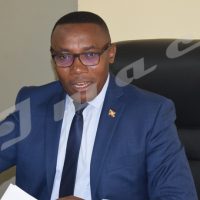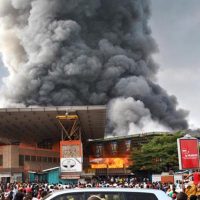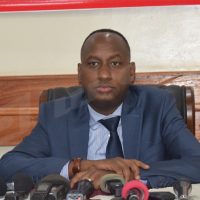The US Embassy in Burundi invited journalists in a telephonic press briefing on “Humanitarian assistance over droughts” with David Harden, the USAID Assistant administrator for democracy, conflict and humanitarian assistance.

Burundian journalists in the telephonic press briefing in the US Embassy
“About 18 million people are at risk, climate change sends shocks through the entire economic and social systems.
And so there are risks of children who will have stunting, or farmers who will have to eat the seeds instead of the ones that they are planting. There will be currency risks, there will be broader economic unemployment risks, and in the health sector I think that it is absolutely possible to see risk, both for HIV/AIDS patients, and in terms of increased risk for cholera. Then, massive humanitarian assistance is an immediate need”, says David Harden, during a telephonic press briefing held in New York, on 27 July. He goes on saying that the UN has got six months to reduce shocks and stresses. “It is possible. The United States also remains committed to supporting country led-efforts to build resilience to climate shocks and stresses in the region”, he adds.
Then, the US government has already provided almost $ 400million in relief and development programs to mitigate droughts’ impacts in Malawi, Mozambique, Madagascar, Lesotho and Swaziland.
Since March 2015, the United States has provided close to $ 1 billion in emergency assistance to countries impacted by El Niño globally, and adjusted development efforts. “Our integrated response has three pillars such as mobilizing an early and robust humanitarian response to meet immediate needs, activating emergency resources in development efforts to protect gains made as well as adjusting development programs to mitigate impacts and accelerate recovery,” he indicates.
For David Harden, this US funding shows that the US is committed to helping find solutions to climate change related problems in Southern Africa. “The population means a lot to Washington,” he underlines, by indicating that the US will do its best to reduce the shocks and stresses for the next six months.
For Jean Pierre Nkunzimana, Public Affairs Officer and Information Assistant of the US Embassy in Burundi, the telephonic press briefing which is organized for the first time aims at handling African issues over droughts caused by climate change. “Today, the focus was on Southern Africa, but this will continue until Burundi has its turn,” he states.



















 IWACU Open Data
IWACU Open Data

